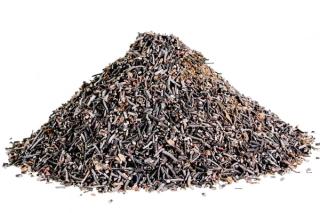
Will it all come out in the wash? A laundry list of false sustainability claims to avoid
by Emily Williams
View post

Euan’s article explains how trommel fines – small-diameter material which is produced from waste treatment in the recycling centre – can be turned from a financial burden, to an investment, using anaerobic digestion.
For most people in the world who have never seen how a recycling plant operates, they might have a rough picture in their mind of how it works. All the recyclable material from the bin goes into the plant, and various machinery and people sort it into the different materials.
However, one thing that you may not be aware of is how much material is discarded at the start of the process as it’s impractical or too costly to separate. This material usually ends up in landfill or as fuel to Energy from Waste (EfW). Typically, a mechanised recycling plant will include an initial screening step, using either a trommel or a ballistic separator. The aim is to remove small-diameter material, generally with a screen size of 50 to 100 mm. This screened material is known as fines, or trommel fines.
While this does seem wasteful, it’s worth noting that recycling plants separate the different streams on an item-by-item basis, not in tonnes per hour. The separation takes place either with a person picking out things by hand or an optical sorter that fires jets of air at each item as it passes over the end of a conveyor belt.
As non-recycled material, these fines not only reduce the overall material recycling rate but also impose a financial burden on the plant operator, particularly if the material is landfilled, and landfill tax is levied on it accordingly.
The history of the taxation of trommel fines is chequered, but the bottom line is that since 2012, HMRC expects standard landfill tax to be paid, if that is the disposal route. Operators can limit their tax burden if the material is confirmed as inert by a loss on ignition (LOI) result of less than 10%. In addition, disposal to landfill or EfW attracts a gate fee, an additional cost to the recycling plant operators.
For reference, the standard rate of landfill tax is £96.70/tonne this year, but for inert material, is it £3.10/tonne. This cost has led to some illegal behaviour, including 100 tonnes of trommel fines dumped in a school car park, and “ro-ro” trailers filled with fines and abandoned.
A potential solution to dealing with the materials is to digest the organic material within it. For fines with high organic content, it can be fed into a dry, plug flow anaerobic digester. In an anaerobic digestion (AD) plant, a range of different microorganisms work together to break down organic matter into biogas, a mixture of mostly methane and carbon dioxide. This process is commonly used for food and agricultural waste to generate energy and renewable natural gas, known commonly as biomethane.
This biomethane can be injected into the gas grid where incentives such as RTFCs and the forthcoming Green Gas certificates can be claimed. RTFCs would be of particular interest for a trommel fines AD as waste feedstock can claim double certification, effectively doubling the incentive.
These plug flow digesters operate in the UK already but only process garden and food waste rather than trommel fines. The technology can easily be adapted, though, providing the feedstock has a volatile solids content of around 50% or more. This would tend to favour fines that are produced by recycling plants that handle “black bag” waste.
This is not to say that there are no potential issues. As with all waste feedstocks, contamination can lead to significant problems. Trommel fines are known for containing a large amount of glass and grit that could cause excessive wear on the digester internals. The gas generated also has higher contamination risk than from “normal” AD feedstocks, so effective clean-up is required before use.
The solid output of the plant, known as digestate, also needs to be dealt with as a waste. This will remain a waste product, and the LOI levels will likely mean that standard landfill tax would be applied, but there is less of it, as some have been converted to biogas.
None of these issues are insurmountable but must be considered during the design and construction of the plant.
Strabag and Martin are two technology providers working on suitable plant concepts. Each has references plants, including one in Vallodolid, Spain, commissioned in 2002 and initially dealt with 14% glass in the feedstock. There is also the plant in Amarsul, Portugal, that processes 44,000 tonnes a year of trommel fines.
This technology is being looked at for the UK as well, but as you would expect, building a business case for the first plant of its type in the country is not always easy. Delivering a commercially viable plant is a complex task. It will come down to the gas yield of the fines, the volume of fines available, and the costs of disposing of the plant output.
In summary, trommel fines are a major issue for the waste industry, and in some cases, processing through dry AD can help. Ensuring that contamination levels are manageable is critical, as well as ensuring that the solid material output can be managed appropriately and cost-effectively. Nonetheless, these plants can be profitable and offer a means of generating renewable, incentivised energy from a problematic waste stream.

by Emily Williams

by Stuart Heather-Clark, Sue Reuther, Stephan Van Den Berg

by Miguel Oyarbide, Alisha Lewis, Charlie Hodkinson-Ashford, Germán Saenz, James Scott, Nikkie Vinke